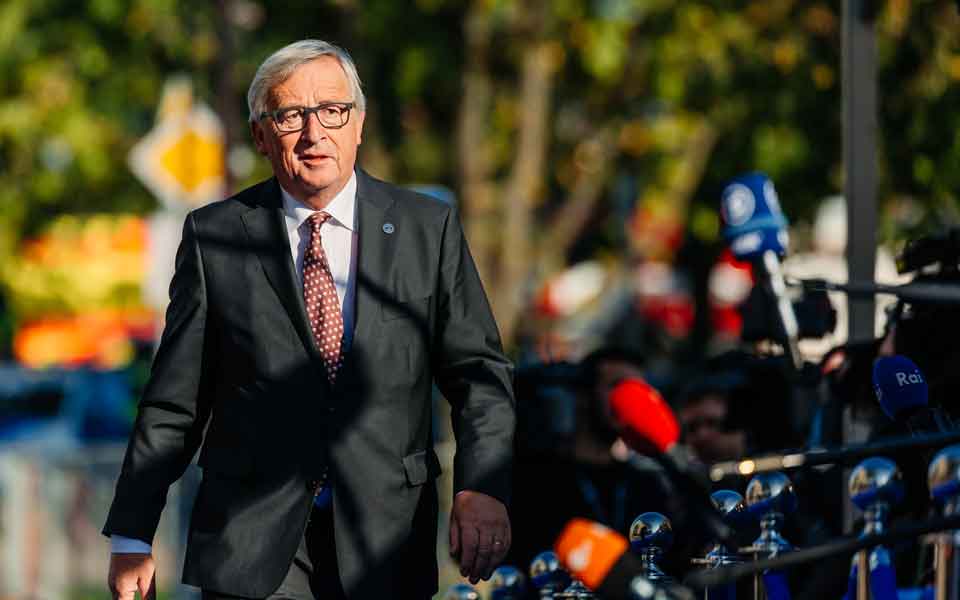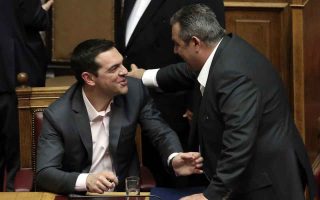The trials of reform in the eurozone

Naturally, Greece concerned itself mostly with the visit of Turkish President Recep Tayyip Erdogan last week. The European Union, meanwhile, largely focused on the achievement of an initial agreement with the British government over Brexit on Friday.
Squeezed in between these developments, though, was another potentially significant development: The European Commission proposed its ideas for changes to the eurozone, with the overarching aim of ensuring deeper integration of the single currency area but also in the hope that complaints about democratic legitimacy and lack of preparedness to combat crises are sufficiently addressed.
“Today’s robust economic growth encourages us to move ahead to ensure that our economic and monetary union is more united, efficient and democratic, and that it works for all of our citizens,” said European Commission President Jean-Claude Juncker on the back of macroeconomic data that suggests the eurozone is on course for its best performance in a decade. “There is no better time to fix the roof than when the sun is shining.”
Titled “Completing Europe’s Economic and Monetary Union,” the policy package set out by Brussels includes the creation by 2019 of the post of European finance minister, who would be responsible for monitoring member-states and have at his or her disposal the use of EU budget tools. The new official would also be a senior member of the European Commission and chair meetings of the Eurogroup.
Also, the European Commission proposes that the European Stability Mechanism (ESM), which is currently responsible for overseeing Greece’s third bailout program, becomes the European Monetary Fund by mid-2019. The new EMF would still have the role of being a rescue fund but would be given a more substantial part in putting together the bailouts, replacing the role fulfilled by the International Monetary Fund in eurozone financial support programs. The EMF would also operate as a 60-billion-euro backstop to the Single Resolution Fund, which deals with failing banks in the eurozone.
Furthermore, the Commission calls for providing cash incentives to countries that carry out structural reforms and special funds for non-euro economies to prepare for adoption of the single currency. It suggests doubling the budget for the Structural Reform Support Program to 300 million euros by 2020.
Almost as important to what is in the policy package is what has been left out. While the EU’s executive arm backs the idea of creating a eurozone budget, it is not in the form originally envisioned by French President Emmanuel Macron, who wanted it to be used as a catalyst for growth. Instead, Brussels proposes that it should have a “stabilization function” to protect investments by providing loans, while it would have a “limited grant component.” The money for the eurozone facility would come from loans from the EU budget, voluntary contributions from member-states and loans from the ESM/EMF with guarantees from the EU budget.
The Commission also sidestepped the idea backed by Germany and some other eurozone member-states which would see the formation of a sovereign insolvency mechanism that would lead to the private sector suffering haircuts on sovereign bold holdings if a country’s public debt reaches a certain level. Advocates of the scheme believe it would encourage prudent fiscal policy in eurozone capitals but others fear it could tip countries with a high debt-to-GDP ratio into default because investors would shy away from buying bonds well before it reaches whatever level is decided.
The proposals were met with some skepticism and criticism, with some analysts wondering why the Commission is putting forward its suggestions now, especially as there is no new government yet in Germany, the eurozone’s economic powerhouse. Some commentators have suggested the policy package is an attempt by Brussels to steal a march on the member-states and set the agenda for the future discussion.
Janis Emmanouilidis, director of studies at the European Policy Center (EPC) in Brussels, suggests the Commission is involved in a fine balancing act which takes into account that some of the bolder proposals for eurozone reform, such as those made by Macron after he came to power, have been watered down recently but it also wants to “defend EU interests and its own interests.” He explains that there is concern in Brussels that the reforms eventually agreed, particularly with respect to the EMF, could weaken the Commission’s position in institutional terms.
The difficulty in agreeing how to make changes to the eurozone lies in satisfying those countries whose focus is mostly on the need for member-states to show responsibility and those that are calling for more solidarity. As such, the Commission’s proposals should not be seen as anything more than Brussels trying to influence the debate. “If there is a compromise on eurozone reform, it will be completely different to what is being proposed by the Commission,” Emmanouilidis tells Kathimerini English Edition. “The starting point will be the agreement between Paris and Berlin. If there is a Franco-German initiative that is not just symbolic, this will be the point of departure for eurozone reform.”
Apart from the continuing doubts regarding the identity and intentions of the next German government, it may also prove difficult to convince eurozone leaders to agree to any significant changes now that the single currency area is emerging from its period of economic difficulty and producing strong growth and employment figures.
There is clearly a long way to go in this discussion and from a Greek point of view, the government in Athens, according to Emmanouilidis, should pay particular attention to the ideas regarding the ESM/EMF and what the role of eurozone finance minister will entail.
“If this person is double-hatted, they may be mostly under the influence of the governments,” he says. “Imagine if you have someone who takes instructions from the powerful member-states and you do not have someone to balance that. Imagine how this could have affected things for Greece in 2015, or 2012, when it was in such a vulnerable position. It would not have been in the interests of a country like Greece.”
As they stand, the European Commission’s proposals try to create a framework for discussion on eurozone reform. It is possible the debate will move outside these confines in the months to come as a tug-of-war begins between member-states over which direction to take. Athens will have to keep a close eye on the shifting patterns to make sure it does not get caught out.





